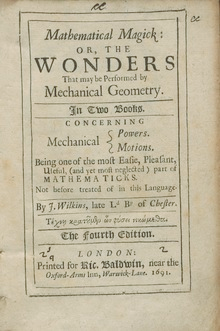Charles Schmitt Prize 2017 til Mark Thomas Young
The Charles Schmitt prize is awarded annually by the international society of intellectual history (ISIH) to a doctoral student or recent postdoc for an essay in any area of intellectual history, broadly construed, from 1500 to the present, including the historiography of intellectual history.

Hovedinnhold
Mark’s essay “Enchanting Automata: Wilkins and the Wonder of Workmanship” explores the concept of wonder utilized by the early modern natural philosopher John Wilkins in his Mathematical Magick (1648). It argues that the traditional Aristotelian conception of wonder, as a psychological state characterized by an absence of rational understanding, fails to account for the positive meaning of wonder as an experience of skilled workmanship which emerges from the text itself . The article draws upon work by British anthropologist Alfred Gell, to outline a conception of technical wonder based upon skill, which increases alongside rational understanding. By arguing in this way for a form of technological wonder in its own right, Mark aims to demonstrate how the dominant conceptions of wonder in the history of science have failed to do justice to the rich variety of ways in which mechanical technology was experienced in early modern England.
Abstract:
Since Aristotle, it has been common to understand wonder as a psychological state characterized by an absence of rational understanding. Early modern treatises on mechanics often gave expression to this view by suggesting that the wonder of mechanical devices is enhanced by deliberately concealing the causal principles upon which they functioned. The prevalence of this idea in the early modern period, has led a number of historians to suggest that the wonder which had long characterized the experience of automata, experienced a decline corresponding to the increased availability of theoretical treatises on mechanics. This article seeks to challenge this view by examining the relationship between rational and practical modes of technical understanding in John Wilkins’ Mathematical Magick (1648). Amongst early modern mechanical treatises catering to the virtuoso, Wilkins’ work is unique in the extent to which it explores the difficulties faced in designing and constructing mechanical devices. My aim will be to show that a close reading of the second book of the Mathematical Magick reveals an alternative conception of wonder as an experience of skilled workmanship that both tolerates theoretical understanding and is increased through practical experience. It will be my claim that the conception of technical wonder which emerges from Wilkin’s descriptions of automata, reveals how the Aristotelian concept of wonder is too reductive to capture the variety of ways in which mechanical technology was experienced in early modern England.
